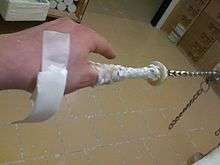Chinese finger trap

A Chinese finger trap (also known as a Chinese finger puzzle, Chinese thumb cuff, Chinese handcuffs and similar variants) is a gag toy used to play a practical joke on unsuspecting children and adults. The finger trap is a simple puzzle that traps the victim's fingers (often the index fingers) in both ends of a small cylinder woven from bamboo.
Design
The initial reaction of the victim is to pull the fingers outward, but this only tightens the trap. The way to escape the trap is to push the ends toward the middle, which enlarges the openings and frees the fingers.
The tightening is simply a normal behavior of a cylindrical, helically wound braid, usually the common biaxial braid. Pulling the entire braid lengthens and narrows it. The length is gained by reducing the angle between the warp and weft threads at their crossing points, but this reduces the radial distance between opposing sides and hence the overall circumference. The more one pulls, the more the circumference shrinks and the trap tightens. The same effect is used in specialized textile manufacturing, the Kellems grip (a cable puller for electrical work), Indonesian woven fruit presses, and by fly-fishers.

Chinese finger traps are not intended for use as restraint devices. Strong victims of the prank may break the bamboo strips when they pull outwards, attempting to free their fingers and stretching the trap beyond its limits. However, a variation on the Chinese finger trap has uses in orthopedic medicine — namely, providing even pressure to the patient's digit(s) and at the same time immobilizing the joints — and serves a similar purpose as a traction device.
Cultural influence
The Chinese finger trap is also a common metaphor for a problem that can be overcome by relaxing, i.e. not trying too hard to solve it; for example, in Acceptance and Commitment Therapy.[1] The gag has been used in a number of films and television productions, such as the Stan Laurel short Dr. Pyckle and Mr. Pryde (1925),[2] the Our Gang short Moan and Groan, Inc. (1929), the "This Little Wiggy" episode of the American show The Simpsons in 1998,[3] the Dexter's Laboratory episode "Unfortunate Cookie", The Addams Family in 1991, and the Star Trek: The Next Generation episode "The Last Outpost", in which Lt. Commander Data is stumped by the device.
References
- ↑ Eifert, Georg H. and Forsyth, John P. Acceptance & Commitment Therapy for Anxiety Disorders: A Practitioner's Treatment Guide to Using Mindfulness, Acceptance, And Values-Based Behavior Change Strategies. New Harbinger Publications, 2005, p. 146.
- ↑ Bellotto, Adam (April 19, 2014). "Dr. Pyckle and Young Frankenstein: A History of Horror Movie Spoofs". filmschoolrejects.com. Retrieved June 18, 2014.
- ↑ Martyn, Warren; Wood, Adrian (2000). "This Little Wiggy". BBC. Retrieved 2007-10-25.
External links
| Wikimedia Commons has media related to Chinese finger trap. |